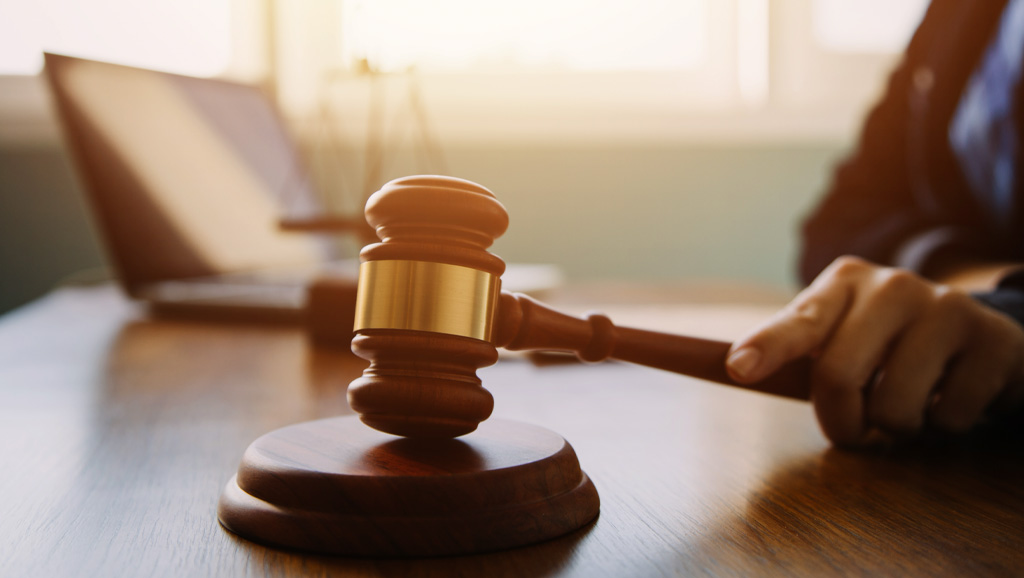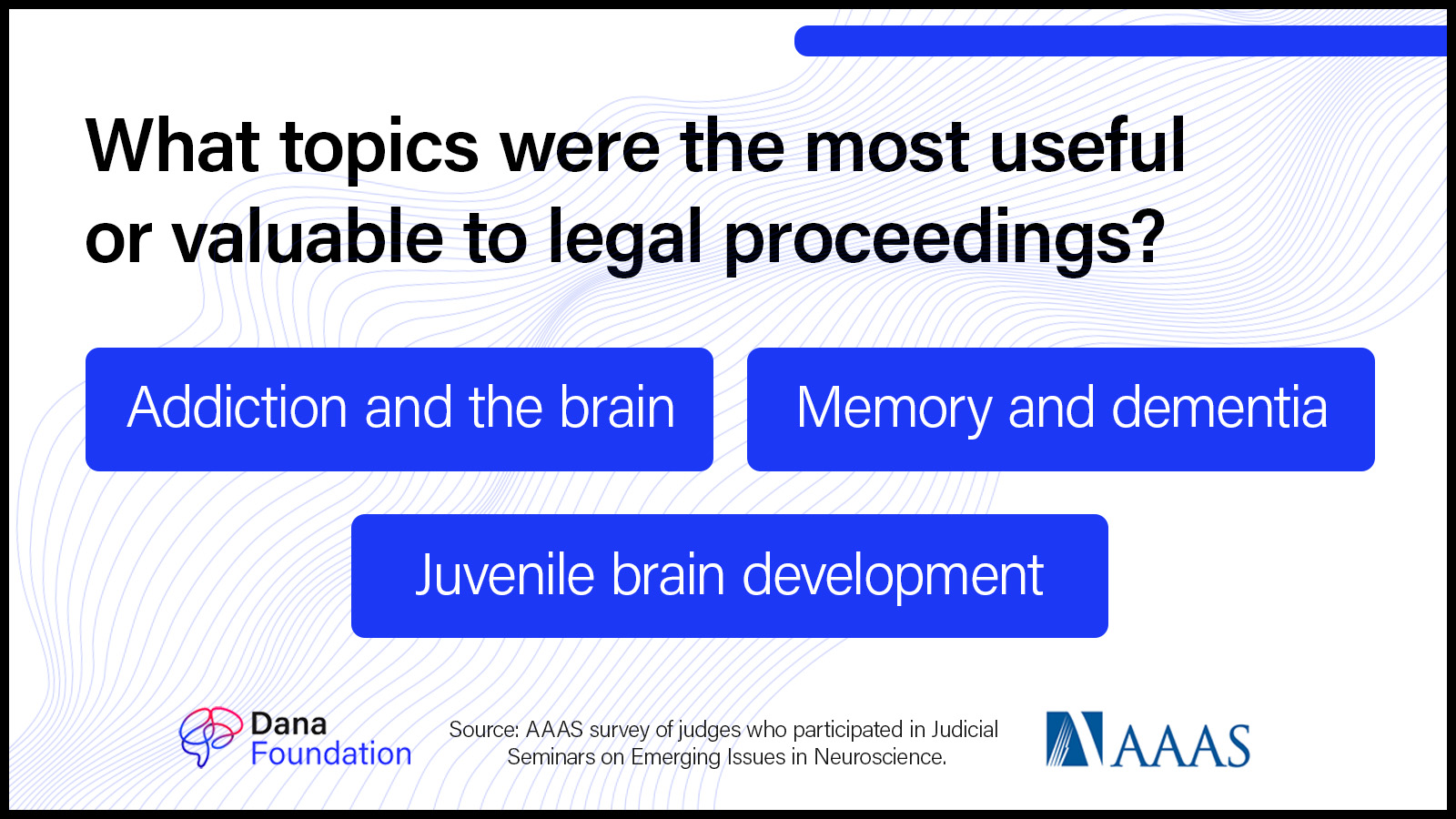Impact Story
Broadening Legal Perspectives in Neuroscience
A Retrospective on AAAS Judicial Seminars on Emerging Issues in Neuroscience

Neuroscience and the law is a rapidly emerging field that raises important questions about how our understanding of the brain can influence legal principles and practices. As neuroscience advances, it offers new insights into human behavior, decision-making, and mental health, which can impact how the legal system addresses issues such as criminal responsibility, mental competency, witness credibility, and sentencing and rehabilitation.
The question of how developments in neuroscience might interact with the law led the American Association for the Advancement of Science (AAAS) to partner with the Dana Foundation in 2003 to convene a meeting with participants from both the legal and neuroscience communities. Lawyers, judges, law professors, philosophers, psychologists, psychiatrists, and neuroscientists discussed the potential benefits and risks of neuroscience advancements in law and society. This meeting marked the beginning of a fruitful relationship between AAAS and the Dana Foundation and led to the Foundation’s support of judicial education programs on the intersection of neuroscience and law.
From 2006 through 2024, AAAS convened seminars on emerging issues in neuroscience for federal, state, administrative, and tribal court judges. The goal of the seminars was to educate judges on advances in the fields of neuroscience and cognitive psychology. The short-term objectives were to increase judges’ knowledge and understanding of pertinent neuroscience topics and their ability to recall that information during relevant legal proceedings. The long-term objective was to increase judges’ confidence with integrating emerging neuroscience topics in relevant legal proceedings. The ultimate impact of the seminars was to improve the accuracy and fairness of legal proceedings regarding neuroscience at the federal and state levels.
Over the 18-year program span, more than 700 judges participated in 34 in-person seminars and five online webinars. More than 70 different session topics were presented over these years, including neuroanatomy, neuroscience methods, and technology; the neuroscience of violence; the neuroscience of memory; the adolescent brain; disorders of consciousness including coma and minimally conscious states; the aging brain and dementia; the neuroscience of addiction; the neuroscience of deception; and much more.
While post-seminar evaluations from attendees were consistently positive, AAAS recently commissioned a retrospective study to help determine whether the seminars achieved their objectives. The study, conducted by New Editions Consulting, Inc., aimed to assess what information judges had retained and how their participation in the seminars altered or improved their self-efficacy in cases involving neuroscience-related matters. A three-month evaluation included a survey sent to 451 past participants, with 84 responses and five follow-up interviews.
The findings indicate that the seminars were impactful on participating judges’ practice and decision-making, and this data will help AAAS and other interested organizations identify potential next steps to further connect judges with neuroscience. Some of the study’s key findings are outlined below, and the full report can be found on the AAAS website.
Key Findings:
- 77% of respondents strongly agreed that they learned new information about neuroscience pertinent to legal proceedings.
- 72% strongly agreed that the seminar increased their knowledge, understanding, and confidence in neuroscience topics.
- 60% strongly agreed that the seminar was useful as it related to their work on the bench.
- More than 74% of respondents said they were able to recall and apply information about neuroscience that they received during the seminar in a relevant legal proceeding.
- Nearly 74% of respondents experienced increased confidence when integrating emerging neuroscience topics into relevant legal proceedings.
Increased Knowledge and Understanding of Neuroscience
Before participating in a seminar, approximately 44% of survey respondents described their level of neuroscience knowledge as fair. After the seminar, their neuroscience literacy increased, with nearly 54% reporting a very good level of knowledge. Seventy-one percent of respondents strongly agreed that the seminar increased knowledge, understanding, and confidence of topics in neuroscience, with 77% reporting that they learned new neuroscience information that is pertinent to legal proceedings.
In a follow-up question that asked which seminar presentation or topic was most useful or valuable to legal proceedings, the top three responses were: addiction and the brain, memory and dementia, and juvenile brain development. One respondent commented, “As a trial court judge handling juvenile and domestic relations matters, every presentation contained salient information that I have utilized in my court.”


Another respondent who presides over a mental health treatment court, and cases ranging from criminal, to family law, to child protection, shared, “The neuroscience training gave me a bank of knowledge to draw on again and again, and often I don’t even consciously realize that I’m drawing on that [information] to help me make these daily decisions that have a huge impact on the lives of hundreds to thousands of people.”
Several respondents shared how the knowledge they gained improved their practice, with one reporting that participating in the seminar, “increased my capacity to serve with confidence in a wide spectrum of cases before me.” Others shared, “I believe I have a solid foundation/framework to listen to evidence and understand the issues,” and “It has provided me with better tools to assess and investigate treatment options for supervisees.”
Increased Confidence with Integrating Neuroscience Topics During Legal Proceedings
Nearly 74% of respondents reported increased confidence integrating neuroscience into relevant legal proceedings. Several respondents shared how they incorporated what they learned in the program, with several focusing on juvenile brain development. One shared, “I work with teenage delinquent boys a great deal. I have spent time remembering and helping probation [officers] and parents understand that despite the sometimes-terrible outcomes from ill-considered or fool-hardy choices, they can grow and develop more considerate decision-making skills as their brain develops.”
Another wrote, “In a key ruling on a remand hearing of a 15-year-old accused of murder, juvenile brain development was a key issue as to whether to remand the juvenile to adult court. (I did not).”
Other respondents reported that they had increased confidence in seeking additional opportunities to learn about neuroscience. One shared, “I actually went on to take a phenomenal course in medical neuroscience through the online program of Duke [University]. Very demanding and I might not have undertaken it but for this introduction.” Another respondent shared that, “I find myself actively reading articles on neuroscience.”
Ability to Recall and Apply Neuroscience Information in a Relevant Legal Proceeding
After participating in a seminar, more than 74% of respondents reported that they were able to recall and apply information they learned about neuroscience in a relevant legal proceeding. When asked what they were able to recall and apply, information about addiction, juvenile brain development, and memory and dementia were most often cited.
“Interacting with adolescents in a post-pandemic world can be challenging,” one respondent stated. “However, the information about the adolescent brain has been so helpful when creating alternatives to detention for young people.”
Another reported, “I applied the information about the actual length of detox, the change in brain function caused by substances, and the most effective punishments for drug users who violate court orders to my cases.” A third respondent shared that, “I sought additional examinations and assessments on individuals prior to sentencing if I suspected other factors, suggested at the training, were present.”
Other respondents reported how the neuroscience information they learned changed their perspective in legal proceedings. One wrote, “When sentencing criminal behavior, I always keep in mind brain chemistry can change.” Another commented that, “It helped change the way I dealt with relapses of probationers with addiction.”
Looking to the Future
The survey and interview included some forward-looking questions to help inform future judicial education on neuroscience. When asked how the seminars could be improved, respondents suggested citing more cases where neuroscience was pertinent to the legal proceedings and providing online learning resources on the topics.
In a related question about what educational resources would be beneficial for learning more about neuroscience and its implications in law, responses included additional in-person seminars, more reading materials, podcasts, videos on key topics, and regular updates on relevant issues—indicating judges’ continued interest in engaging with neuroscience. The report recommends that AAAS implement some of these suggestions in future seminars.
When asked whether they would recommend the seminars to a colleague, 100% of survey respondents said yes, with several sharing they would do so because of neuroscience’s relevancy to legal proceedings.
As judges, we need to understand how people perceive their world and their experiences in it and how that is related back in their thoughts, words, and behavior.”
One respondent wrote, “As judges, we need to understand how people perceive their world and their experiences in it and how that is related back in their thoughts, words, and behavior.” Another stated, “Today’s judges need more knowledge about neuroscience to better dispense justice and compassion and weigh the risks to society certain persons present.” And a third noted, “This learning is often directly relevant to many cases. However, even more helpful to a judge is a better understanding of the people we engage with using the best science of the brain and nervous system.” These comments underscore the importance of continuing to provide judges with neuroscience education opportunities like the AAAS seminars to help inform their decision-making and improve outcomes for justice-involved individuals, their families, and the communities in which they live.
To learn more about the intersection of neuroscience and the law, visit the Resources section of the Dana Foundation’s website, which includes a law and neuroscience bibliography, a neurolaw news archives, and a fascinating talk between a neurolaw expert and professor of psychology on the impact of adolescent brain research on our legal system, public policy, and society.



